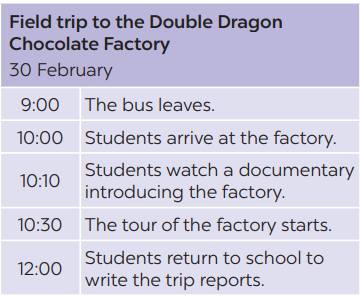Tiếng Anh 8 Unit 8 A Closer Look 2
1. Complete the sentences with the adverbs of frequency from the box. 2. Read the schedule of the field trip for the grade 8 students tomorrow, and underline the verbs in the sentences. Then answer the questions. 3. Write A next to a sentence if it refers to a timetable, schedule or plan, and B if it is an unplanned future action. 4. Choose the correct option to complete each sentence. 5. Work in pairs. Ask and answer to check planned events for the community fair next month.
Bài 1
Grammar
Adverbs of frequency (Trạng từ chỉ mức độ thường xuyên)
1. Complete the sentences with the adverbs of frequency from the box.
(Hoàn thành các câu với các trạng từ chỉ tần suất trong hộp.)
|
always often sometimes rarely never |
1. My mother _____ shops at the supermarket. She never shops anywhere else.
2. I _____ buy things online, just once or twice a year. I prefer to shop at the shopping mall.
3. You can _____ bargain at a supermarket because the prices are fixed.
4. How _____ do you retum things you buy online?
5. I don't often buy things at the dollar store. My mother only takes me there _____.
Phương pháp giải:
- always: luôn luôn
- often: thông thường
- sometimes: thỉnh thoảng
- rarely: hiếm khi
- never: không bao giờ
dollar shop: cửa hàng mà tất cả các loại mặt hàng đều có giá 1 đô
Lời giải chi tiết:
|
1. always |
2. rarely |
3. never |
|
4. often |
5. sometimes |
|
1. My mother always shops at the supermarket. She never shops anywhere else.
(Mẹ mình luôn mua đồ ở siêu thị. Bà ấy không bao giờ mua đồ ở bất cứ đâu khác.)
2. I rarely buy things online, just once or twice a year. I prefer to shop at the shopping mall.
(Mình hiếm khi mua đồ trên mạng, chỉ một hai lần một năm. Mình thích đi mua sắm ở trung tâm thương mại hơn.)
3. You can never bargain at a supermarket because the prices are fixed.
(Bạn không bao giờ có thể mặc cả ở siêu thị vì giá ở đó đã cố định.)
4. How often do you return things you buy online?
(Bạn có thường hoàn trả những thứ bạn đã mua trên mạng không?)
5. I don't often buy things at the dollar store. My mother only takes me there sometimes.
(Mình không thường mua đồ ở những cửa hàng một đô. Lâu lâu mẹ mình mới đưa mình đến đó.)
Bài 2
Present simple for future events
(Thì hiện tại đơn chỉ sự việc trong tương lai)
2. Read the schedule of the field trip for the grade 8 students tomorrow, and underline the verbs in the sentences. Then answer the questions.
(Đọc lịch trình của chuyến dã ngoại cho học sinh lớp 8 vào ngày mai, và gạch dưới các động từ trong câu. Sau đó trả lời các câu hỏi.)

1. What tense are the verbs in the sentences?
(Thì của động từ trong các câu là thì gì?)
2. Are the sentences about habits or future activities?
(Các câu nói về sở thích hay các hoạt động tương lai?)
Lời giải chi tiết:
|
Field trip to the Double Dragon Chocolate Factory (Chuyến đi đến Nhà máy sô-cô-la Double Dragon) 30 February (30 tháng 2) |
|
|
9:00 |
The bus leaves. (Xe buýt khởi hành.) |
|
10:00 |
Students arrive at the factory. (Học sinh đến nhà máy.) |
|
10:10 |
Students watch a documentary introducing the factory. (Học sinh xem một đoạn phim tài liệu giới thiệu về nhà máy.) |
|
10:30 |
The tour of the factory starts. (Chuyến thăm quan nhà máy bắt đầu.) |
|
12:00 |
Students return to school to write the trip reports. (Học sinh trở về trường để viết bài thu hoạch về chuyến đi.) |
1. The verbs in the sentences are present simple tense.
(Các động từ trong câu đều ở thì hiện tại đơn.)
2. The sentences are about future activities.
(Các câu nói về hành động trong tương lai.)
Bài 3
3. Write A next to a sentence if it refers to a timetable, schedule or plan, and B if it is an unplanned future action.
(Viết A bên cạnh một câu nếu nó đề cập đến thời gian biểu, lịch trình hoặc kế hoạch và B nếu đó là một hành động không có kế hoạch trong tương lai.)
1. We'll go to Costco to return this suitcase. ___
2. Look! We have a whole afternoon for shopping on the second day of our tour. ___
3. The summer sales end next Sunday. ___
4. Listen to the announcement. The train doesn't leave till 12:00. Let’s get something to drink. ___
5. I'm too busy today, so we'll go shopping on Tuesday. ___
Lời giải chi tiết:
|
1. B |
2. A |
3. A |
4. B |
5. B |
1. We'll go to Costco to return this suitcase. B
(Chúng ta sẽ đến Costco để trả lại cái vali.)
2. Look! We have a whole afternoon for shopping on the second day of our tour. A
(Nhìn kìa! Chúng ta có cả một buổi chiều để mua sắm vào ngày thứ hai của chuyến đi.)
3. The summer sales end next Sunday. A
(Đợt giảm giá mùa hè kết thúc vào Chủ nhật tuần sau.)
4. Listen to the announcement. The train doesn't leave till 12:00. Let’s get something to drink. B
(Xin lắng nghe thông báo. Tàu sẽ không khởi hành cho đến 12 giờ. Hãy kiếm cái gì uống đi.)
5. I'm too busy today, so we'll go shopping on Tuesday. B
(Hôm nay mình quá bận rộn rồi, nên chúng ta sẽ đi mua sắm vào thứ Ba.)
Bài 4
4. Choose the correct option to complete each sentence.
(Chọn phương án đúng để hoàn thành mỗi câu.)
1. The supermarket in my neighbourhood opens / will open longer hours than the one in yours.
2. Don’t worry. I make / will make a shopping list, and you just give it to the shop owner.
3. We don’t buy / won't buy a birthday cake this year. We can bake one at home instead.
4. The bus schedule says that there is / will be a bus to Aeon at 10:05.
5. Look at the advertisement. Does / Will the big sale start next Friday?
Lời giải chi tiết:
|
1. opens |
2. will make |
3. won't buy |
4. is |
5. Does |
1. The supermarket in my neighbourhood opens longer hours than the one in yours.
(Siêu thị ở khu mình sống mở cửa nhiều giờ hơn siêu thị ở chỗ bạn.)
Giải thích: Hành động thời gian mở cửa của siêu thị là hành động theo thời khóa biểu, nên trong câu này ta sẽ sử dụng thì hiện tại đơn. Do đó từ cần chọn là opens.
2. Don’t worry. I will make a shopping list, and you just give it to the shop owner.
(Đừng lo. Mình sẽ viết một cái danh sách mua sắm, và cậu chỉ cần đưa nó cho chủ cửa hàng.)
Giải thích: Đây là hành động diễn ra mà không có dự tính trước trong tương lai, được quyết định ngay thời điểm nói, trong trường hợp này ta sẽ sử dụng thì tương lai đơn. Do đó từ cần chọn là will make.
3. We won't buy a birthday cake this year. We can bake one at home instead.
(Chúng ta không mua bánh sinh nhật năm nay. Thay vào đó chúng ta sẽ nướng một cái ở nhà.)
Giải thích: Đây là hành động diễn ra mà không có dự tính trước trong tương lai, được quyết định ngay thời điểm nói, trong trường hợp này ta sẽ sử dụng thì tương lai đơn. Do đó từ cần chọn là won’t buy.
4. The bus schedule says that there is a bus to Aeon at 10:05.
(Lịch trình xe buýt cho biết có một xe buýt đến Aeon vào 10 giờ 5 phút.)
Giải thích: Hành động trong câu là hành động diễn ra theo lịch trình, nên trong câu này ta sẽ sử dụng thì hiện tại đơn. Do đó từ cần chọn là is.
5. Look at the advertisement. Does the big sale start next Friday?
(Nhìn vào quảng cáo kìa. Có phải đợt giảm giá lớn bắt đầu vào thứ sáu tuần sau không?)
Giải thích: Đây là hành động được diễn ra theo kế hoạch được thông báo, tức là đã được lên kế hoạch trước, nên trong câu này ta sẽ sử dụng thì hiện tại đơn. Do đó từ cần chọn là does.
Bài 5
5. Work in pairs. Ask and answer to check planned events for the community fair next month.
(Làm việc theo cặp. Hỏi và trả lời để kiểm tra các sự kiện đã lên kế hoạch cho hội chợ cộng đồng vào tháng tới.)
|
Community Fair (Hội chợ cộng đồng) 1 April (1 tháng 4) |
|
|
Date (Ngày) |
Events (Sự kiện) |
|
1 March (1/3) |
Preparing for the fair (Chuẩn bị cho hội chợ) |
|
3 March (3/3) |
Calling for volunteers (Kêu gọi tình nguyện viên) |
|
1 April (1/4) |
8:30: Opening (8:30: Khai mạc) 11:00: Holding food competition (11:00: Tổ chức cuộc thi ẩm thực) |
|
2 April (2/4) |
Cleaning up by volunteers (Tình nguyện viên dọn dẹp) |
Example: (Ví dụ)
A: When do we start preparing for the fair?
(Khi nào chúng ta sẽ bắt đầu chuẩn bị cho hội chợ?)
B: We start on the first of March.
(Chúng ta sẽ bắt đầu vào ngày 1 tháng Ba.)
Lời giải chi tiết:
A: When do we start calling for volunteers?
(Khi nào chúng ta bắt đầu kêu gọi tình nguyện viên?)
B: We start calling for volunteers on the 3rd of March.
(Chúng ta bắt đầu gọi tình nguyện viên vào ngày 3 tháng 3.)
A: What do we do on the first of April?
(Chúng ta sẽ làm gì vào ngày 1/4?)
B: At 8:30, we start opening. At 11:00, we hold food competition.
(Vào 8 giờ 30, chúng ta sẽ bắt đầu khai mạc. Vào 11 giờ, chúng ta sẽ tổ chức cuộc thi ẩm thực.)
A: When do volunteers start cleaning up?
(Khi nào các tình nguyện viên bắt đầu dọn dẹp?)
B: They start clean up on the 2nd of April.
(Họ bắt đầu dọn dẹp vào ngày 2 tháng 4.)
Search google: "từ khóa + timdapan.com" Ví dụ: "Tiếng Anh 8 Unit 8 A Closer Look 2 timdapan.com"







